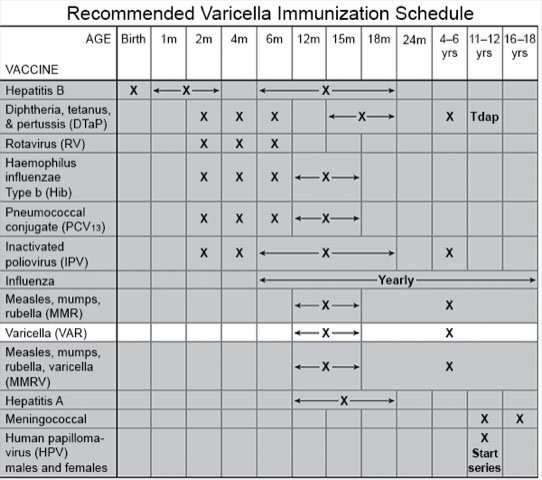Chickenpox Vaccine for Children
Medically reviewed by Drugs.com. Last updated on Aug 4, 2025.
What is the chickenpox vaccine?
The chickenpox, or varicella, vaccine is an injection given to protect your child from chickenpox. Chickenpox is a disease caused by the varicella virus. The vaccine may be given by itself or combined with other vaccines.
When should my child get the chickenpox vaccine?
Your child should receive 2 doses. Your child's healthcare provider will tell you when to bring your child in for the second dose. The timing is based on your child's age when the first dose is given.
- The first dose is given at 12 to 15 months.
- The second dose is usually given at 4 to 6 years.
- Children older than 6 years can get the first dose at any time.
 |
What should I tell my child's doctor before the vaccine is given?
- Your child takes a medicine that weakens the immune system, such as steroids.
- Your child takes a salicylate medicine, such as aspirin.
- Your child has a weakened immune system, such as from cancer or HIV.
- Your child has a family history of immune system problems.
- Your child has any severe allergies.
- Your child received a blood transfusion in the past 11 months.
- Your child got any other vaccines within the past 4 weeks.
What are reasons my child should not get the chickenpox vaccine?
- Your child had a severe allergic reaction to gelatin or neomycin.
- Your child had a severe allergic reaction to the first dose of the chickenpox vaccine.
What are reasons my child should wait to get the chickenpox vaccine?
- Your child is sick or has a fever.
- Your child takes antiviral medicine. Stop the medicine and wait at least 1 day before getting the chickenpox vaccine. Wait 14 days after the vaccine is given to restart antiviral medicines. Examples of antiviral medicines include acyclovir, famciclovir, and valacyclovir.
- Your adolescent is pregnant.
- Your child had a smallpox vaccine less than 4 weeks ago.
Related medications
Treatment options
The following list of medications are related to or used in the treatment of this condition.
- measles virus vaccine/mumps virus vaccine/rubella virus vaccine/varicella virus vaccine
- ProQuad
- Rotarix
- RotaTeq
- rotavirus vaccine
What are the risks of the chickenpox vaccine?
The area where the vaccine was given may be red, tender, or swollen. Your child may still get chickenpox, even after he or she gets the vaccine. Your child may have an allergic reaction to the vaccine. This can be life-threatening.
What safety precautions are needed after my child gets the chickenpox vaccine?
- Do not give aspirin or other salicylate medicines for 6 weeks after a dose of varicella vaccine. Aspirin and other salicylate medicines increase the risk for a serious condition called Reye syndrome after a varicella vaccine. Talk to your child's healthcare providers about safe medicines if needed to control a health condition.
- If your child develops a rash, do not let him or her near anyone who is not protected against chickenpox. A rash is a sign that the varicella virus can spread to others. Your child's healthcare provider can tell you when your child will no longer be able to spread the varicella virus. This is usually after the rash goes away.
Call your local emergency number (911 in the US) if:
- Your child's mouth and throat are swollen.
- Your child is wheezing or has trouble breathing.
- Your child has chest pain or his or her heart is beating faster than usual.
- Your child feels like he or she is going to faint.
When should I seek immediate care?
- Your child's face is red or swollen.
- Your child has hives that spread over his or her body.
When should I call my child's doctor?
- Your child feels weak or dizzy.
- Your child has increased pain, redness, or swelling around the area where the shot was given.
- You have questions or concerns about the chickenpox vaccine.
Care Agreement
You have the right to help plan your child's care. Learn about your child's health condition and how it may be treated. Discuss treatment options with your child's healthcare providers to decide what care you want for your child. The above information is an educational aid only. It is not intended as medical advice for individual conditions or treatments. Talk to your doctor, nurse or pharmacist before following any medical regimen to see if it is safe and effective for you.© Copyright Merative 2025 Information is for End User's use only and may not be sold, redistributed or otherwise used for commercial purposes.
Learn more about Chickenpox Vaccine for Children
Treatment options
Care guides
Medicine.com guides (external)
Further information
Always consult your healthcare provider to ensure the information displayed on this page applies to your personal circumstances.
